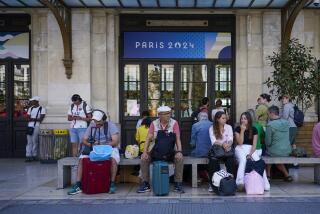Longest French Strike in 3 Decades Ends : Labor: After concessions by premier, railway workers declare victory and vote to return to jobs.
- Share via
PARIS — A 22-day strike by French transport workers that paralyzed the nation and forced key government concessions on social security reform crumbled Friday as many subway and train lines rumbled to life and most unionists voted to return to their posts.
The beginning of the end of the strike, which by Friday had equaled the longest major work stoppage in France in nearly three decades, was warmly welcomed by commuters, who have endured enormous traffic jams with surprising stoicism, and by merchants, who have seen pre-Christmas sales fall as much as 60%.
Support for the strike among railway workers, who led the stoppage, had steadily weakened after a series of concessions from Prime Minister Alain Juppe, though national, regional and subway trains had remained idle until Friday. And calls for other public workers to join the strike had, for the most part, gone unheeded.
As many trains resumed their runs, unions in several key cities decided to call off the strike, declaring victory. And most were able to negotiate partial payment of wages lost during the strike.
The Communist-led General Confederation of Workers, the largest union in the strike, said its railway workers had voted to go back to work “while remaining vigilant and mobilized for other actions.” And the other key union, Force Ouvriere, said most workers had voted to return Sunday or Monday.
“The rail workers’ victory . . . is textbook proof of the force that workers’ unity and union unity brings,” said Louis Viannet, secretary-general of the General Confederation of Workers.
Then, Jean Bergougnoux, head of the state-run SNCF national railway, tendered his resignation, having become the government scapegoat when Juppe criticized the lack of dialogue between SNCF management and unions.
Nevertheless, union leaders called for a massive turnout today for nationwide demonstrations against a Juppe-backed reform plan and promised to continue to demand that the plan be withdrawn.
The government transport minister said he believed that full service countrywide could be resumed by Tuesday.
The strike, watched closely by other European countries with entrenched state welfare systems in need of reform, was an important test of Juppe’s plan to reduce France’s social and health benefits.
Juppe, with the support of President Jacques Chirac, had insisted that the move was “the only option” to cut the nation’s $65-billion deficit, to restore economic health to a country with a jobless rate of nearly 12% and to qualify for European monetary union by 1997.
Both Juppe and union leaders could claim a partial victory after the three weeks of labor unrest, but many of the issues that divide them remain to be settled during a “social summit” Juppe has called for next week. And the government is not out of the woods yet.
*
With substantial sympathy for their cause among the French public, which also fears Juppe’s cost-cutting plan, the unions forced Juppe to abandon his plan to increase, from 37 1/2 years to 40 years, the amount of time public service employees must work to qualify for a full pension.
And the conservative prime minister made special concessions to railway workers, allowing train and subway conductors to keep a benefit, dating from the days when such jobs included shoveling coal into steam engines, that allows them to retire at age 50.
Juppe was also forced to jettison his plan to restructure the SNCF railway company, half of whose lines lose money, and begin from scratch.
But Juppe never did meet a union demand that he completely withdraw his reform program, a move that could have precipitated his resignation.
Still intact are plans for higher taxes, wage freezes and health-care cost controls to reduce debt in the social security system, which provides medical care, pensions and special allowances to families with children.
And, perhaps more important, Juppe’s political career has survived, at least for now, despite union calls for his resignation.
Under the French system, the president appoints the prime minister to lead the government. In practice, French premiers act as a kind of fire wall for presidents in times of social unrest. In the past four decades, no prime minister has survived a president’s entire seven-year term.
The return of subway service to some parts of Paris on Friday was greeted with jubilation by weary commuters, who passed the word excitedly on the streets.
Nearly half the system’s lines were running, and some city buses were back on the streets.
“Things are starting to roll a little bit. It’s a positive sign,” Transportation Minister Bernard Pons told Radio Luxembourg.
Mail delivery was also improving Friday, with just 2% of workers striking and fewer disruptions.
More to Read
Sign up for Essential California
The most important California stories and recommendations in your inbox every morning.
You may occasionally receive promotional content from the Los Angeles Times.














